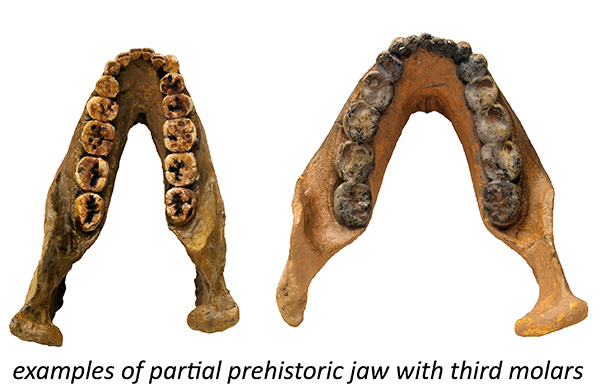As an orthodontist fascinated by the evolution and development of faces, jaws and teeth of both humans and animals, Dr. Razdolsky loves to share with patients the evolution of wisdom teeth.
“Just like the rest of your teeth, your wisdom teeth form inside the jawbone only to emerge much later than all your other teeth,” said Dr. Yan Razdolsky of Forever Smiles Orthodontics in Buffalo Grove. “In fact, second molars begin development around age three, while development of your wisdom teeth or third molars, can vary wildly - some starting as early as age five, and for others as late as age 15,” he added.
This means they can erupt from the gums anywhere between the ages of 17 to 24, if not even older! So why do wisdom teeth erupt so late, and we do we even have them?
 According to Dr. Razdolsky, compared to modern humans our prehistoric ancestors had toothier mouths, larger molars, and thicker enamel. This has most largely been attributed to dietary changes. For example, early human diets consisted of course, hard-to-chew foods like roots, nuts, leaves and meats that required immense jaw strength and larger elongated jaws. With evolution and the shift to cooked foods, farming and a reliance on a softer food palette, our brains have become larger and jaws began shrinking over the course of millions of years to today where humans typically end up with smaller jaws with barely room for 32 teeth, including four wisdom teeth, by the time we are fully adult.
According to Dr. Razdolsky, compared to modern humans our prehistoric ancestors had toothier mouths, larger molars, and thicker enamel. This has most largely been attributed to dietary changes. For example, early human diets consisted of course, hard-to-chew foods like roots, nuts, leaves and meats that required immense jaw strength and larger elongated jaws. With evolution and the shift to cooked foods, farming and a reliance on a softer food palette, our brains have become larger and jaws began shrinking over the course of millions of years to today where humans typically end up with smaller jaws with barely room for 32 teeth, including four wisdom teeth, by the time we are fully adult.


“This evolution has changed us so much that studies indicate that worldwide it is estimated that wisdom teeth become impacted in approximately 24 percent of people and about 22 percent of people do not even have them at all,” said Dr. Razdolsky.
For those that do have wisdom teeth that are impacted or not able to develop normally, extraction surgery may be necessary. For most, this procedure is best performed before you are 21 years of age, or before the roots grow deep enough to touch the nerve. Extraction too though can carry risk including damage to nearby teeth, surrounding jawbone, nerves, sinuses or possibly even infection. So while impacted wisdom teeth may need to come out, treatment for wisdom tooth problems is something that should be carefully weighed and evaluated before pursuing.
Luckily, Dr. Razdolsky and your Forever Smiles team make early observation a priority for safe and effective orthodontic treatment. By evaluating patients as early as age seven, they monitor development of teeth, as well as jaw growth to watch out for potential issues before they become a problem for patients.
“Interceptive treatment can increase a child chances of avoiding surgery, future extraction of permanent healthy teeth and even help correct oral habits that can cause a bad bite,” said Dr. Razdolsky. “In addition, we follow the patient history and development to keep a watchful eye on things like the wisdom teeth and can help anticipate the best treatment option unique for each patient.”
Even better, research shows that your wisdom teeth will not cause your other teeth to shift or become crooked. So while your wisdom teeth do not have any effect on your alignment or bite, it is in fact your jaw and position of other teeth that may cause your wisdom teeth to become impacted.
For comparison, let’s look at our closest cousin the ape. Apes rarely have impacted wisdom teeth. Studies suggest this is due to their diet. Same for humans who eat non-industrialized diets. Like our ancestors, our jaws still expect biomechanical stimulation from hard crunchy foods to fully develop. This stimulation increases jaw strength and length allowing ample room for our teeth to fully erupt. So if your still growing, start eating crunchier, chewier foods like raw vegetables and raw foods. While Dr. Razdolsky says there is no scientific evidence it will make any difference, it definitely won’t hurt.
“Some dental scientists suggest that increasing the crunchy hard foods on your plate could help with issues like misaligned teeth and underdeveloped jaws. So, what do you really have to lose”? asked Dr. Razdolsky. “Besides any benefit it could provide to jaw development, foods like those are simply good for your overall systemic health as well. So maybe it’s a win, win,” he added.



